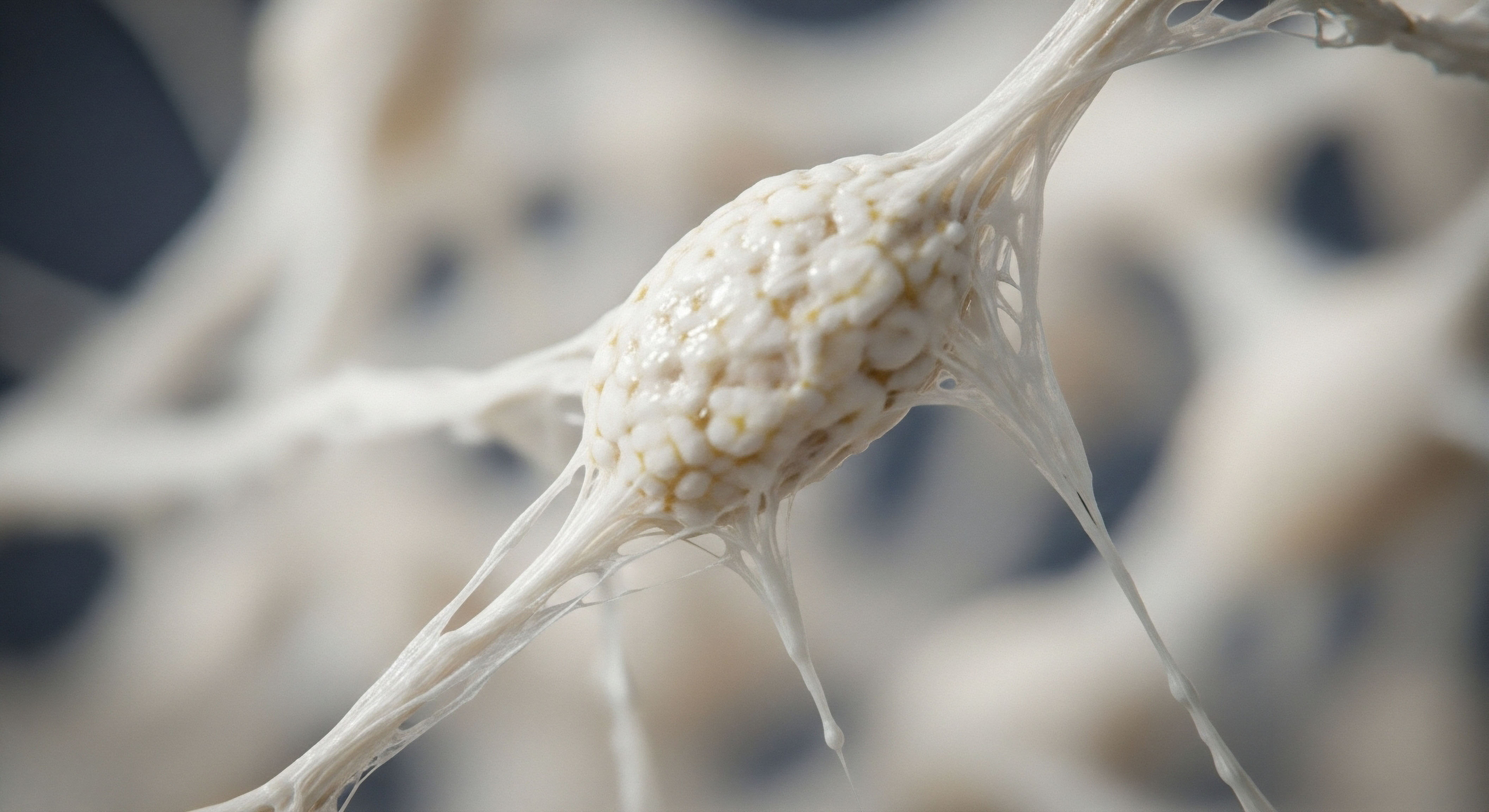

Fundamentals
You feel it before you can name it. A subtle shift in mental clarity, a word that vanishes just as you try to speak it, a frustrating inability to hold a train of thought. This experience, often dismissed as an inevitable consequence of aging or stress, has a deep biological reality rooted in the body’s intricate endocrine system.
The sensation of “brain fog” is not a personal failing; it is a physiological signal. Your cognitive function is intimately tied to the precise, fluctuating symphony of hormones that govern your body’s operations. When this internal messaging service begins to experience disruptions, the brain is one of the first and most sensitive systems to register the change.
Hormones such as estrogen, testosterone, and progesterone are powerful neuroactive molecules. They do more than regulate reproductive health; they actively shape the brain’s structure and function. Estrogen, for instance, supports neuronal growth and connectivity, particularly in regions vital for memory like the hippocampus. Testosterone influences neurotransmitter systems that are critical for focus, motivation, and spatial reasoning.
Progesterone and its metabolites have a calming effect on the nervous system, which is essential for quality sleep ∞ a non-negotiable requirement for memory consolidation. The decline of these hormones during perimenopause in women or andropause in men creates a new internal environment, one to which the brain must adapt. This adaptation period is often where cognitive symptoms arise, signaling a shift in the biochemical landscape that has supported your mental acuity for decades.
Understanding the connection between hormonal shifts and cognitive symptoms is the first step toward reclaiming mental clarity.
The conversation about hormonal health extends beyond just sex hormones. The entire endocrine network, a web of glands and chemical messengers, works in concert. This includes neurosteroids like pregnenolone and DHEA, which are synthesized directly within the brain and act as master regulators of neural excitability and plasticity.
They are fundamental to protecting neurons from damage and modulating the very processes of learning and memory. Similarly, the growth hormone axis, which influences cellular repair and metabolism, also plays a role in maintaining cognitive vitality. When we consider personalized hormone therapy, we are looking at a systematic approach to restoring the balance of this entire interconnected system.
The goal is to provide the brain with the specific biochemical support it needs to function optimally, moving beyond a one-size-fits-all model to a protocol tailored to your unique physiology and lived experience.


Intermediate
When we address cognitive changes through hormonal optimization, the approach is highly individualized, guided by comprehensive lab work and a detailed understanding of your symptoms. The protocols are designed to restore hormonal levels to a range that supports optimal physiological function, including brain health. This process involves more than simply replacing a single deficient hormone; it requires a nuanced understanding of the interplay between various endocrine pathways.

Protocols for Male Hormonal Optimization
For men experiencing symptoms of low testosterone, including cognitive difficulties, a standard and effective protocol involves Testosterone Replacement Therapy (TRT). This is typically administered through weekly intramuscular injections of Testosterone Cypionate. The objective is to bring testosterone levels into a healthy, youthful range, which can have a direct impact on cognitive functions like attention and memory. However, a successful TRT protocol is a carefully managed system.
- Anastrozole ∞ An aromatase inhibitor, is often prescribed to be taken twice weekly. It works by blocking the conversion of testosterone into estrogen, thereby preventing potential side effects associated with elevated estrogen levels in men.
- Gonadorelin ∞ This is a crucial component for maintaining testicular function. Administered as a subcutaneous injection twice a week, Gonadorelin stimulates the pituitary gland to produce luteinizing hormone (LH), which in turn signals the testes to continue their own testosterone production. This helps preserve fertility and testicular size.
- Enclomiphene ∞ In some cases, Enclomiphene may be included in the protocol. This selective estrogen receptor modulator can help to support the body’s natural production of LH and follicle-stimulating hormone (FSH), further supporting the integrity of the hypothalamic-pituitary-gonadal (HPG) axis.
For men who wish to discontinue TRT or prioritize fertility, a specific protocol is employed to restart the natural hormonal cascade. This often includes a combination of Gonadorelin to stimulate the testes, along with medications like Tamoxifen or Clomid, which work at the level of the pituitary to increase LH and FSH output.

Protocols for Female Hormonal Balance
For women, particularly those in the perimenopausal and postmenopausal stages, hormonal therapy is aimed at alleviating a wide range of symptoms, including the pervasive “brain fog” and memory lapses. The research indicates that the timing of intervention is important, with benefits often seen when therapy is initiated closer to the onset of menopause. The protocols are tailored to the individual’s menopausal status and specific hormonal needs.
Personalized hormone therapy for women often involves a delicate balance of testosterone and progesterone to address both cognitive and physical symptoms.
| Hormone Protocol | Typical Administration | Primary Therapeutic Goal |
|---|---|---|
| Testosterone Cypionate | Low-dose weekly subcutaneous injections (e.g. 10-20 units) | Improve libido, energy, and mental clarity. |
| Progesterone | Oral capsules or topical creams, dosed according to menopausal status | Balance estrogen, improve sleep quality, and provide neuroprotective effects. |
| Pellet Therapy | Long-acting testosterone pellets inserted subcutaneously | Provide a steady, long-term release of testosterone. |
In women, even a small, carefully dosed amount of testosterone can make a significant difference in cognitive function and overall well-being. Progesterone is equally important, not only for uterine protection in women who have not had a hysterectomy but also for its own neuroactive properties. It can enhance sleep quality, which is fundamental for cognitive restoration. The choice between different delivery methods ∞ injections, pellets, or creams ∞ is made based on patient preference, lifestyle, and the specific hormonal response desired.

Growth Hormone Peptide Therapy
Beyond traditional hormone replacement, peptide therapies offer a more targeted way to influence the endocrine system. Growth hormone secretagogues, such as a combination of Ipamorelin and CJC-1295, are designed to stimulate the body’s own production of growth hormone from the pituitary gland.
This approach can be beneficial for both men and women seeking to improve cognitive function, as growth hormone plays a role in cellular repair, sleep quality, and overall vitality. These peptides are typically administered through subcutaneous injections and are often used to complement other hormone optimization protocols.


Academic
A sophisticated analysis of hormonal influence on cognition requires moving beyond a simple replacement model to a systems-biology perspective. The brain is not merely a passive recipient of hormonal signals; it is an active, dynamic environment where neurosteroids and peripheral hormones modulate synaptic plasticity, neurotransmission, and neuronal survival.
The efficacy of personalized hormone therapy in improving cognitive outcomes is deeply dependent on the intricate interplay within the hypothalamic-pituitary-gonadal (HPG) axis and the local synthesis of neurosteroids within the brain itself.

The Critical Window Hypothesis and Neuroprotection
In the context of female cognitive health, the “timing hypothesis” has become a central tenet. Extensive research, including follow-up analyses of the Women’s Health Initiative Memory Study (WHIMS), suggests that the neuroprotective benefits of estrogen therapy are most pronounced when initiated during a “critical window” around the onset of menopause.
When started in early postmenopause, estrogen therapy has been associated with improved verbal memory and a more youthful pattern of hippocampal function. Conversely, initiating therapy in late life, particularly with certain progestins like medroxyprogesterone acetate (MPA), has shown neutral or even detrimental effects on cognition.
This suggests that estrogen’s role may be primarily preventative, preserving neuronal architecture and function before significant age-related decline occurs. The mechanism likely involves estrogen’s ability to support mitochondrial function, reduce inflammation, and promote synaptic connectivity in key brain regions.

Testosterone and Its Metabolites in Male Cognition
In men, the cognitive benefits of testosterone therapy appear to be linked not only to testosterone itself but also to its downstream metabolites and its interaction with other physiological systems. Some clinical trials have shown that TRT can improve global cognition, attention, and memory in older men with hypogonadism, especially when combined with lifestyle interventions like diet and exercise.
The improvements in cognition are often correlated with increases in lean muscle mass and peak oxygen consumption, suggesting that testosterone’s benefits may be mediated, in part, by improvements in overall metabolic health and physical function. Furthermore, the brain possesses the enzymatic machinery to convert testosterone to both estradiol and dihydrotestosterone (DHT), each of which has its own unique effects on neuronal function.
This intracrine metabolism within the central nervous system means that the cognitive impact of TRT is a composite of the actions of multiple active steroids.
The neurobiological impact of hormone therapy is a function of timing, formulation, and the individual’s unique metabolic and genetic background.

The Emerging Role of Neurosteroids and Peptides
The field is expanding to include a deeper appreciation for neurosteroids synthesized de novo in the brain, such as pregnenolone and DHEA. These molecules act as powerful allosteric modulators of key neurotransmitter receptors, including the NMDA and GABA-A receptors, which are fundamental to learning and memory.
Pregnenolone and its sulfated ester, PREG-S, have been shown in preclinical models to enhance memory and promote myelin repair, suggesting a direct role in maintaining the structural integrity of the nervous system. Clinical protocols that aim to optimize these upstream precursors may offer a more holistic approach to supporting cognitive health, as they provide the raw materials for the brain to synthesize its own neuroprotective compounds.
| Hormone/Peptide | Primary Mechanism of Cognitive Influence | Associated Neurotransmitter/Receptor System |
|---|---|---|
| Estrogen | Promotes synaptic plasticity and neuronal survival. | Acetylcholine, Serotonin, Dopamine, NMDA Receptors |
| Testosterone | Modulates neurotransmitter release and receptor density. | Dopamine, GABA, Acetylcholine |
| Progesterone (Allopregnanolone) | Provides a calming, neuroprotective effect. | GABA-A Receptors |
| Pregnenolone/DHEA | Allosteric modulation of receptor function. | NMDA, GABA-A, Sigma-1 Receptors |
| Ipamorelin/CJC-1295 | Improves sleep quality and cellular repair via GH stimulation. | Ghrelin Receptor (GHS-R1a), GHRH Receptor |
Similarly, growth hormone secretagogues like Ipamorelin and CJC-1295 represent a more targeted intervention. By stimulating the natural pulsatile release of growth hormone, these peptides can improve sleep architecture, which is critical for memory consolidation. Improved sleep and the anabolic effects of growth hormone on cellular repair may create a more favorable environment for cognitive function, illustrating how therapies targeting one aspect of the endocrine system can have far-reaching benefits for the brain.
What are the specific legal frameworks in China governing the importation and prescription of advanced peptide therapies like Tesamorelin or CJC-1295? The future of personalized medicine for cognitive health will likely involve multi-modal approaches that combine traditional hormone replacement with targeted peptide therapies and support for endogenous neurosteroid production, all tailored to the individual’s genetic predispositions and metabolic state.

References
- Cherrier, Monique M. et al. “Testosterone treatment of men with mild cognitive impairment and low testosterone.” American Journal of Alzheimer’s Disease & Other Dementias®, vol. 30, no. 4, 2015, pp. 421-30.
- Genud, R. et al. “Dehydroepiandrosterone (DHEA) treatment for depression.” Revista de psiquiatria clinica, vol. 36, 2009, pp. 230-3.
- Gregori, Giulia, et al. “Cognitive response to testosterone replacement added to intensive lifestyle intervention in older men with obesity and hypogonadism ∞ prespecified secondary analyses of a randomized clinical trial.” The American Journal of Clinical Nutrition, vol. 114, no. 5, 2021, pp. 1590-99.
- Henderson, Victor W. “Alzheimer’s disease ∞ review of hormone therapy trials and implications for treatment and prevention.” Journal of steroid biochemistry and molecular biology, vol. 142, 2014, pp. 99-106.
- Ionescu, Dawn F. and George E. Papakostas. “A role for testosterone in the treatment of depression?.” Metabolic Brain Disease, vol. 32, no. 1, 2017, pp. 1-1.
- LeBlanc, Erin S. et al. “Hormone replacement therapy and cognition ∞ systematic review and meta-analysis.” Jama, vol. 285, no. 11, 2001, pp. 1489-99.
- Maki, Pauline M. and Susan M. Resnick. “Longitudinal effects of estrogen replacement therapy on PET cerebral blood flow and cognition.” Neurobiology of aging, vol. 21, no. 2, 2000, pp. 373-83.
- Mayo, W. et al. “Role of pregnenolone, dehydroepiandrosterone and their sulfate esters on learning and memory in cognitive aging.” Brain Research Reviews, vol. 37, no. 1-3, 2001, pp. 214-30.
- Raivio, T. et al. “The effects of testosterone replacement on cognition in older men.” The Journal of Clinical Endocrinology & Metabolism, vol. 88, no. 4, 2003, pp. 1499-503.
- Shumaker, Sally A. et al. “Estrogen plus progestin and the incidence of dementia and mild cognitive impairment in postmenopausal women ∞ the Women’s Health Initiative Memory Study ∞ a randomized controlled trial.” Jama, vol. 289, no. 20, 2003, pp. 2651-62.
- Teixeira, J. et al. “CJC-1295 and Ipamorelin.” International Journal of Peptide Research and Therapeutics, vol. 26, no. 3, 2020, pp. 1569-74.
- Vallee, M. “Neurosteroids and traumatic brain injury.” Journal of neurotrauma, vol. 33, no. 6, 2016, pp. 531-45.

Reflection
You have now seen the biological architecture that connects your hormonal state to your cognitive world. The information presented here is a map, detailing the intricate pathways and systems that influence how you think, remember, and feel. This knowledge is a powerful tool, shifting the perspective from one of passive acceptance to one of proactive engagement with your own physiology.
Your personal health narrative is unique, written in the language of your own biochemistry. Understanding this language is the foundational step. The next is to consider how this information applies to your own journey, your own body, and your own goals for vitality and function. This exploration is a starting point, opening a door to a more personalized and precise approach to your long-term well-being.



